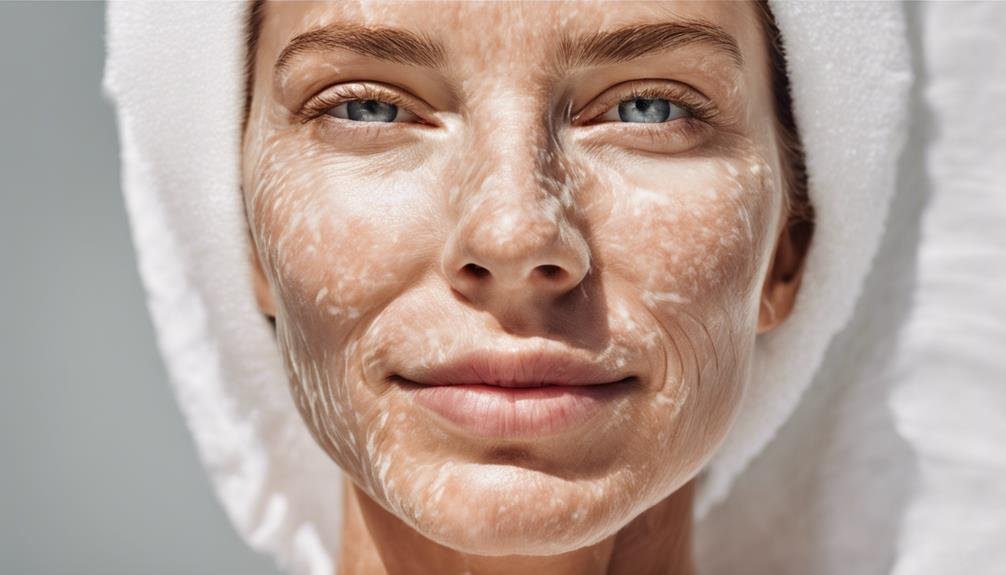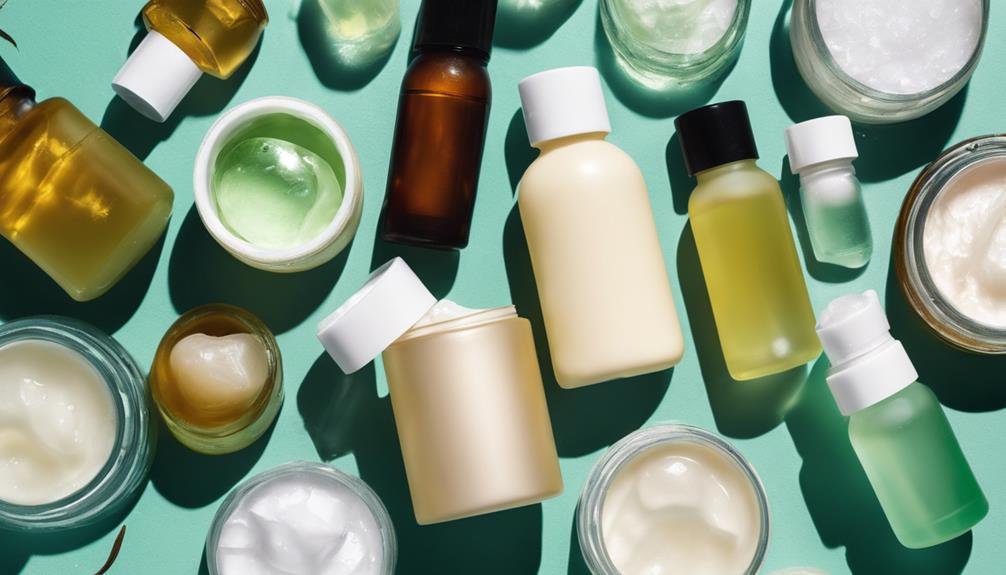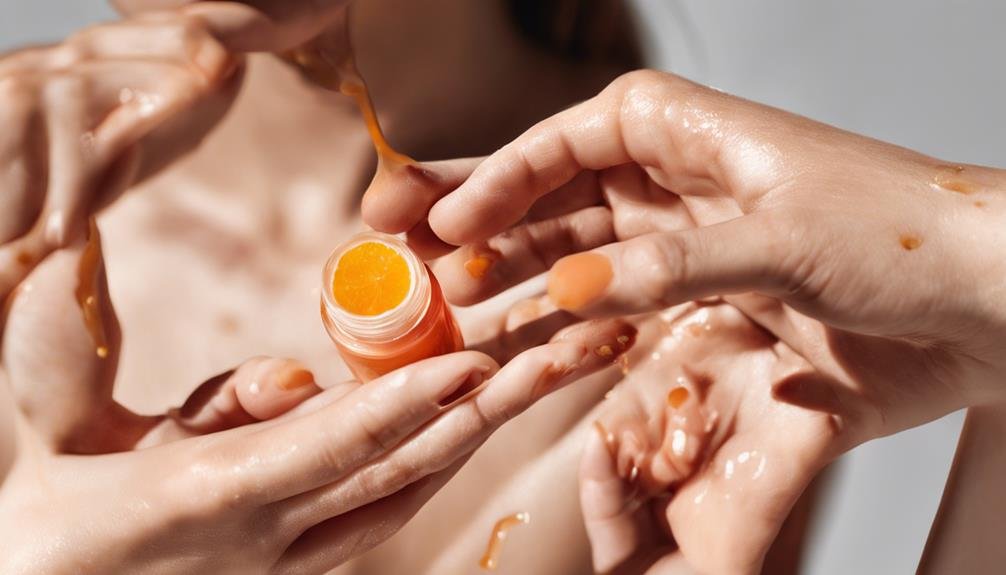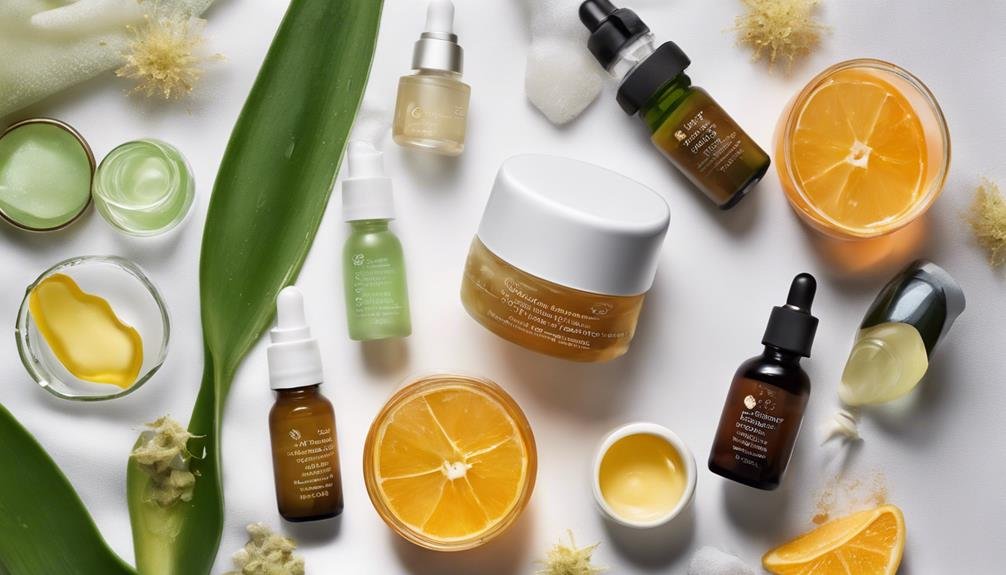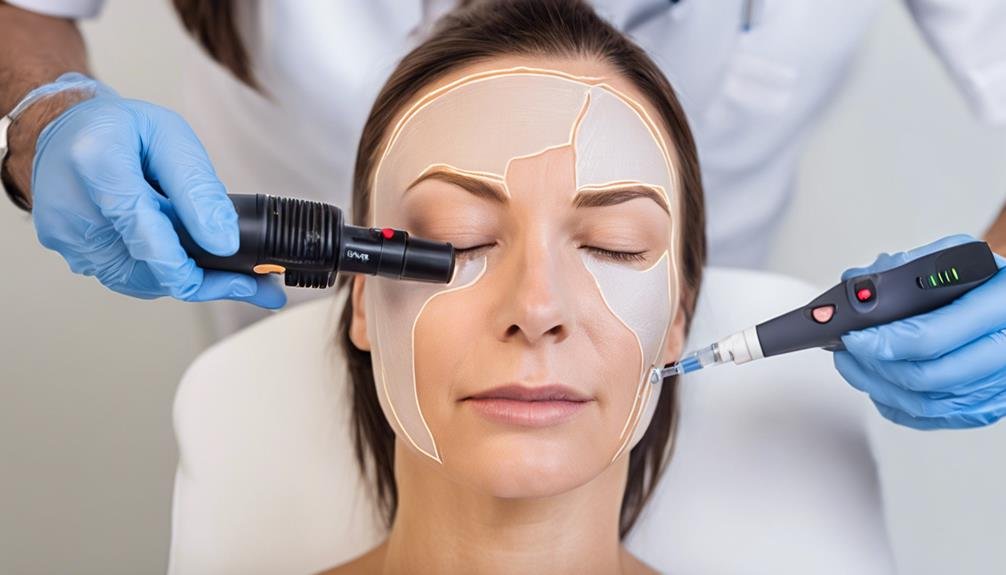If you spend a lot of time under the sun, you might be surprised to learn that up to 90% of visible skin changes are due to sun damage. Wondering how to repair and rejuvenate your sun-damaged skin? Look no further. By following a few simple steps and incorporating the right products and techniques, you can help your skin recover and regain its health and vitality. Let's explore the effective ways to heal and restore your sun-kissed skin to its former glory.
Importance of Sunscreen
Using sunscreen is crucial in protecting your skin from the harmful effects of the sun's UV rays. Sunscreen application is a simple yet effective way to shield your skin from the damaging effects of ultraviolet radiation.
When selecting a sunscreen, opt for a broad-spectrum formula that protects against both UVA and UVB rays. Ensure that the sunscreen has a Sun Protection Factor (SPF) of 30 or higher for adequate UV protection.
To benefit fully from sunscreen, apply it generously to all exposed skin areas at least 15 minutes before going out in the sun. Reapply sunscreen every two hours, or more frequently if you're swimming or sweating.
Remember that UV rays can penetrate clouds and windows, so sunscreen application is necessary even on cloudy days or when indoors near windows.
Consistent use of sunscreen not only prevents sunburn but also reduces the risk of skin cancer, premature aging, and sun damage. By making sunscreen application a daily habit, you're actively caring for your skin's health and promoting long-term wellness.
Gentle Cleansing Techniques
To maintain healthy skin and promote its natural healing process, adopting gentle cleansing techniques is essential. When dealing with sun-damaged skin, it's crucial to be extra gentle to avoid further irritation. Incorporating soothing toners and calming oils into your skincare routine can help nurture and heal your skin.
| Soothing Toners | Calming Oils |
|---|---|
| Chamomile-infused toner | Jojoba oil |
| Aloe vera-based toner | Rosehip oil |
| Cucumber water toner | Lavender oil |
Soothing toners containing ingredients like chamomile, aloe vera, and cucumber water can help calm inflamed skin and reduce redness. Calming oils such as jojoba, rosehip, and lavender oil provide nourishment and hydration, aiding in the repair of sun-damaged skin. When cleansing your skin, opt for gentle products that won't strip away natural oils or cause further damage. Treat your skin with care, and it will thank you by healing and rejuvenating itself.
Hydrating Skin Moisturizers
For optimal skin health and hydration, selecting the right moisturizer is crucial. When it comes to healing sun-damaged skin, incorporating hydrating skin moisturizers can make a significant difference. Here are some tips to help you choose the best moisturizer for your skin:
- Look for natural remedies: Opt for moisturizers containing natural ingredients like aloe vera, coconut oil, or shea butter to nourish and hydrate your skin effectively.
- Prioritize skin hydration: Choose a moisturizer specifically formulated to improve skin hydration levels, helping to repair and rejuvenate sun-damaged skin.
- Consider your skin type: Select a moisturizer that matches your skin type, whether it's dry, oily, combination, or sensitive, to ensure optimal hydration and balance.
- Check for added antioxidants: Some moisturizers include antioxidants like vitamin C or E, which can further protect your skin from sun damage and promote healing.
- SPF protection: Opt for a moisturizer with added SPF to shield your skin from further sun damage while providing essential hydration.
Incorporating Antioxidants
To enhance the healing process of sun-damaged skin, incorporating antioxidants into your skincare routine can play a vital role in protecting and repairing your skin. Antioxidants offer numerous benefits for your skin, including fighting free radicals that are responsible for causing damage, reducing inflammation, and promoting overall skin health. By incorporating antioxidant-rich products like vitamin E, green tea extract, or resveratrol, you can help repair the damage caused by sun exposure.
Antioxidants work by neutralizing free radicals, which are unstable molecules that can harm skin cells and accelerate aging. By integrating antioxidants into your skincare regimen, you can aid in the repair process and prevent further damage. Look for products with antioxidants that are known for their skin repair techniques, such as repairing DNA damage and supporting collagen production.
Including antioxidants in your daily skincare routine can provide an added layer of protection against sun-induced skin damage and promote healthier, more radiant skin.
Repairing Skin With Vitamin C
Harness the power of Vitamin C to effectively repair sun-damaged skin. Vitamin C offers a multitude of benefits for your skin, aiding in its rejuvenation and brightening properties. Here's how you can apply this potent antioxidant to help restore your skin:
- Antioxidant Protection: Vitamin C acts as a powerful antioxidant, protecting your skin from free radical damage caused by UV exposure.
- Collagen Production: This vitamin stimulates collagen production, helping to improve skin elasticity and reduce the appearance of fine lines and wrinkles.
- Hyperpigmentation Reduction: Vitamin C can lighten dark spots and even out skin tone, giving you a more radiant complexion.
- Sun Damage Repair: Its anti-inflammatory properties help repair sun-damaged skin by soothing redness and inflammation.
- Enhanced UV Protection: While not a replacement for sunscreen, Vitamin C can enhance the effectiveness of your sun protection routine, providing an extra layer of defense against UV rays.
Exfoliation for Renewal
Exfoliation is a crucial step in your skincare routine for renewing and revitalizing your skin. By removing dead skin cells, exfoliation helps improve skin texture, unclog pores, and enhance the effectiveness of other skincare products. Two effective methods for exfoliation are chemical peels and microdermabrasion treatments.
Exfoliation Methods
| Exfoliation Method | Benefits | How Often to Use |
|---|---|---|
| Chemical Peels | Improves skin tone and texture | Every 2-4 weeks |
| Microdermabrasion | Smooths skin and reduces fine lines | Every 1-2 months |
Chemical peels use acids to remove dead skin cells and stimulate collagen production, promoting cell turnover. Microdermabrasion treatments use a minimally abrasive instrument to gently exfoliate the outer layer of skin, revealing a fresher complexion. Incorporating these exfoliation techniques into your skincare routine can help in the renewal process and achieve healthier, glowing skin.
Healing Masks and Serums
After exfoliating to renew your skin, the next step in your skincare regimen involves the use of healing masks and serums. Natural remedies and DIY solutions can be effective in repairing sun-damaged skin. Here are some tips for incorporating healing masks and serums into your routine:
- Honey and Aloe Vera Mask: Combine honey and aloe vera gel for a soothing mask that hydrates and calms sun-damaged skin.
- Vitamin C Serum: Use a DIY vitamin C serum to boost collagen production and fade sunspots.
- Turmeric Mask: Turmeric has anti-inflammatory properties that can reduce redness and promote healing in damaged skin.
- Green Tea Mask: Green tea is rich in antioxidants that help repair skin damage caused by sun exposure.
- Oatmeal Mask: Oatmeal can soothe irritated skin and provide relief from sunburn.
Incorporating these natural remedies into your skincare routine can help heal and rejuvenate your sun-damaged skin effectively.
Nutrient-Rich Diet for Skin
To maintain healthy and radiant skin, incorporating a nutrient-rich diet is essential. Consuming skin-friendly foods packed with essential vitamins can help repair sun-damaged skin from the inside out. Opt for foods rich in antioxidants like berries, leafy greens, and nuts, which can combat free radicals generated by sun exposure.
Vitamins A, C, and E play crucial roles in skin health. Vitamin A aids in skin cell turnover, promoting fresh skin growth. Vitamin C boosts collagen production, improving skin firmness and elasticity. Vitamin E protects against UV damage and helps maintain skin hydration. Include foods like sweet potatoes, citrus fruits, and almonds in your diet to ensure you're getting these essential vitamins.
Additionally, omega-3 fatty acids found in fatty fish like salmon or chia seeds can help reduce inflammation and keep skin supple. By incorporating these nutrient-rich foods, you can nourish your skin from within and support its natural healing processes.
Professional Treatments Available
Professional treatments offer advanced solutions for addressing sun-damaged skin and rejuvenating your complexion. When it comes to restoring your skin's health and vitality, consider the following professional treatments:
- Laser Therapy: Utilizing focused light energy to target specific skin concerns and stimulate collagen production.
- Chemical Peels: A procedure involving the application of a chemical solution to exfoliate the skin, revealing a smoother, more even complexion.
- Microdermabrasion: A non-invasive treatment that gently exfoliates the skin to improve texture and promote skin cell turnover.
- Photodynamic Therapy: Combining light therapy with a photosensitizing solution to target damaged skin cells and promote regeneration.
- Professional Consultation: Seek advice from a dermatologist or skincare specialist to determine the most suitable treatment plan for your sun-damaged skin.
These treatments can help address issues such as hyperpigmentation, fine lines, and uneven skin tone caused by sun exposure, supporting your skin's natural healing process and enhancing its overall appearance.
Daily Sun Protection Practices
When considering strategies to combat sun damage and protect your skin from further harm, incorporating daily sun protection practices is paramount.
One effective way to shield your skin from harmful UV rays is by wearing a wide-brimmed hat. This simple accessory provides additional protection to your face, neck, and ears, areas prone to sun damage.
Additionally, taking shade breaks throughout the day can help reduce your overall sun exposure. Seek out shaded areas, like under trees or umbrellas, during peak sun hours to give your skin a much-needed break.
Consistent use of sunscreen is also crucial in your daily sun protection routine. Opt for a broad-spectrum sunscreen with at least SPF 30 and remember to reapply every two hours, especially if you're swimming or sweating.
These practices, when combined with hat protection and shade breaks, can significantly decrease your skin's exposure to damaging UV rays. By incorporating these daily sun protection habits into your routine, you can help prevent further sun damage and maintain healthier, more resilient skin.
Frequently Asked Questions
Can Sun-Damaged Skin Be Reversed Completely?
Yes, sun-damaged skin can be reversed completely through skin rejuvenation procedures and consistent use of topical treatments. These methods help repair and renew the skin, reducing the signs of damage caused by UV exposure over time.
Are Natural Remedies Effective in Repairing Sun Damage?
When it comes to repairing sun damage, DIY treatments and herbal remedies can be effective. They offer natural solutions that may help rejuvenate and nourish your skin. Remember to consult with a skincare professional for personalized advice.
How Long Does It Take to See Results From Treatments?
Results from skincare products may take a few weeks to a few months, varying based on the severity of sun damage. Medical procedures like laser treatments may show improvement sooner, typically within a few weeks.
Can Sun-Damaged Skin Lead to Skin Cancer?
Hey there, did you know that sun-damaged skin can indeed lead to skin cancer? It's crucial to protect your skin with prevention measures, regular skin checks, and knowing the treatment options and risk factors involved. Stay safe and informed!
Is It Necessary to Avoid Sun Exposure Completely for Healing?
To heal sun-damaged skin, gradually reintroduce sun exposure while wearing protective clothing. This approach balances healing with sun exposure benefits. Enjoy the sun safely to promote skin recovery and reduce the risk of future damage.
Conclusion
In conclusion, by incorporating sunscreen, gentle cleansing, hydrating moisturizers, antioxidants, vitamin C, healing masks, a nutrient-rich diet, and professional treatments, you can effectively heal sun-damaged skin. Consistent daily sun protection practices will maintain the health and vitality of your skin. Remember, prevention and care are key to achieving a radiant and healthy complexion.

